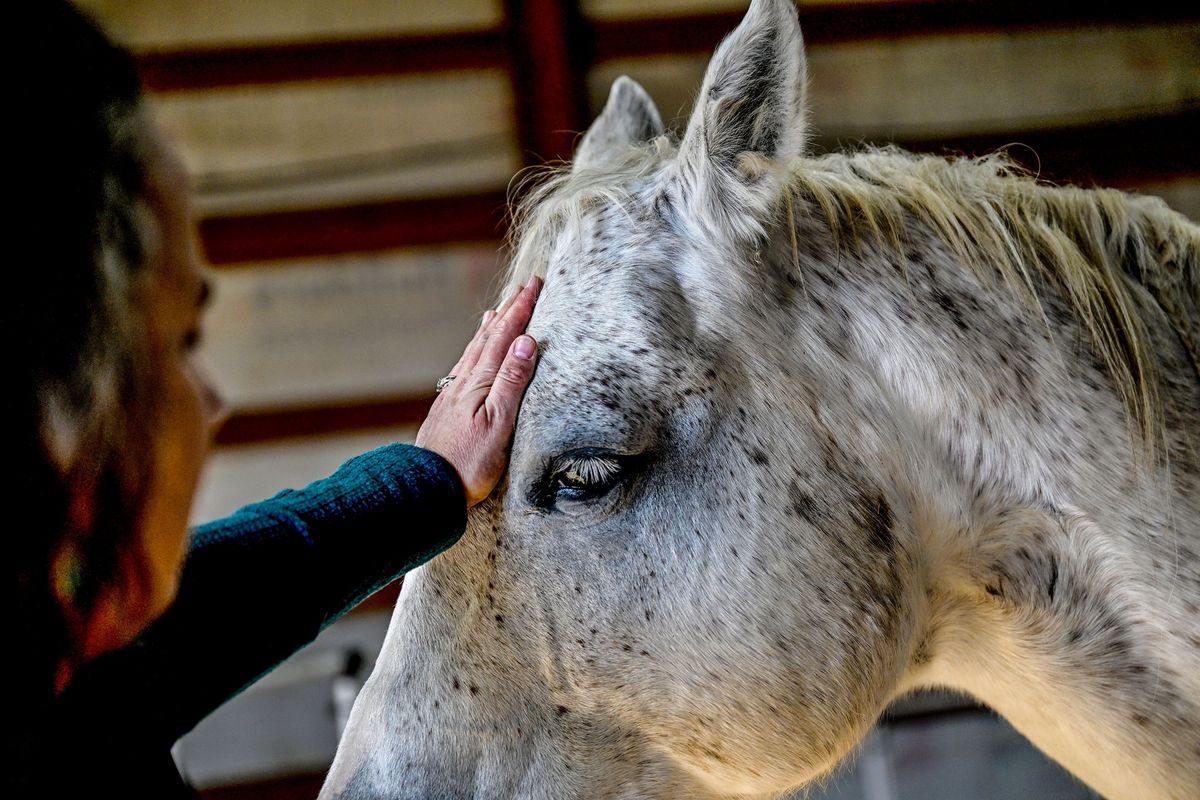‘This is their most important job’: SPD employee uses horses to help people heal from trauma

Jennifer Hammond got hooked on horses after a trail ride five years ago.
She learned one of the women on the ride had gone through an equine therapy program called Touched by a Horse.
“So, I looked it up and I saw, ‘Oh, I can have horses and do good with them,’ ” Hammond said.
After graduating from the two-year program, Hammond, 53, created Wild Skye Healing, her new business where she uses retired sport horses to help people heal from trauma, grief and other life challenges.
Wild Skye operates out of Second Chance Ranch, a nonprofit off U.S. Highway 195 south of Spokane that helps mental health professionals incorporate equine-assisted psychotherapy into their treatment programs as an alternative to conventional “talk therapy,” according to a news release from the ranch.
Katie Merwick, CEO at Second Chance Ranch, said she wanted to connect the mental health industry with equine therapy and prove the exceptional value horses have.
“This is their most important job, the one that they’ll be the best at,” Merwick said.
Equine therapy is a passion Hammond pursues Friday through Sunday when she’s not serving as the Spokane Police Department’s director of business services. There, she oversees evidence and records units, and does some human resources work as well.
Hammond enrolled at Touched by a Horse Equine Gestalt Coaching Certification Program in 2020. The program was founded by Melisa Pearce and is based outside Elizabeth, Colorado, southeast of Denver.
Pearce spent her life with horses and has been part of the horse-human healing movement since the late 1980s, according to Touched by a Horse’s website.
Besides taking Pearce’s program online, Hammond said she had to visit the Colorado ranch eight times for instruction during the two-year period. Each visit lasted about one week.
Hammond said she fell more in love with the career during the course.
“They don’t care about what you’re thinking about, but they do care about your emotions,” Hammond said of horses. “They’re prey animals, and so they’re very good at reading people and reading what’s going on, and so to them, if you’re up in your head just thinking, they’re not too interested in you. But if you’re in your body feeling emotions, they want to be right next to you. They just hold space for you, so if you’re having an emotional thing come up, they’ll just stand there and be with you, and it’s very comforting.”
Since last month, Hammond has been working with clients at Second Chance Ranch.
She speaks with people about their issues and conducts exercises all while a horse watches from a round pen. A 20-year-old white quarterhorse named Daisy is the primary horse she partners with.
Hammond said she might tell a client who is grieving over a dead loved one to visualize that person in an empty chair across from them and unload whatever they would like to say. Sometimes the client is moved to tears.
“That kind of helps that grief move through their body,” Hammond said.
She said the client can then pet and walk with the horse in the round pen.
Hammond said horses like to be in the present with people. They don’t care what happened in the past and are not anxious about the future.
“I love watching the horses work, but it makes me happy to help people let go of stuff they’ve been carrying around for a really long time, and this is a pretty quick, efficient process to do that, and so people feel relief quickly,” Hammond said.
Merwick said Hammond brings phenomenal insight to the ranch.
“There’s very few of the equine therapy programs that do what she does,” she said. “It’s really unique and special, and it’s super effective.”
As a Spokane police employee, Hammond said she hopes first responders use her business.
“I do have a special place in my heart for first responders,” she said. “I would love to bring this work to them and just help them cope better with all the stuff that they have going on.”
Hammond said equine therapy is not traditional therapy. She does not diagnose clients and refers people with mental health disorders and those who are suicidal to the appropriate resource.
“I’m not therapizing,” she said. “I’m just their guide on that journey.”
Visit wildskyehealing.com for more information.